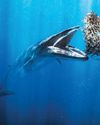
Climate change is the biggest challenge facing the Earth today. Climate change (the long-term change in world weather patterns, caused by human activities) is causing rising temperatures and extreme weather events. However, what if there was a way to cool Earth by reflecting or dimming the Sun?
In 2022, the US company Make Sunsets released two weather balloons above Baja California in Mexico. These balloons were filled with the gases helium and sulfur dioxide. Once the balloons reached a certain height, they burst open, spreading sulfur dioxide particles across the sky. This substance creates a bright haze in the sky that reflects sunlight. A similar weather balloon test flight was launched in the UK, according to a report by MIT Technology Review magazine.
This method is one of a few ways of bouncing sunlight back into space, in a process known as solar geoengineering. Other examples include putting reflectors, or mirrors, onto satellites.
In a world of rising temperatures, dimming the Sun is an immediate way to cool the planet. Luke Iseman, the founder of Make Sunsets, claims that without solar geoengineering “there are no other realistic options to stay below 2°C”. Scientists have warned that if global average temperatures rise by more than 2°C above pre-industrial levels (1850– 1900), then many effects of climate change will be irreversible.
هذه القصة مأخوذة من طبعة Issue 61 من The Week Junior Science+Nature UK.
ابدأ النسخة التجريبية المجانية من Magzter GOLD لمدة 7 أيام للوصول إلى آلاف القصص المتميزة المنسقة وأكثر من 9,000 مجلة وصحيفة.
بالفعل مشترك ? تسجيل الدخول
هذه القصة مأخوذة من طبعة Issue 61 من The Week Junior Science+Nature UK.
ابدأ النسخة التجريبية المجانية من Magzter GOLD لمدة 7 أيام للوصول إلى آلاف القصص المتميزة المنسقة وأكثر من 9,000 مجلة وصحيفة.
بالفعل مشترك? تسجيل الدخول

Camera Obscura
Imagine stepping inside a dark room, where the only source of light comes through one small hole in the wall.

MANCHESTER SCIENCE FESTIVAL
From 18-27 October, shoppers at the Arndale shopping centre in Manchester, England, will face a giant spider.

Should musicians stop touring?
Multiple concerts travelling around the world have a big impact on the environment.

Are ghosts real?
Plenty of people believe in ghosts, but it's hard to find proof.

SMASH STEREOTYPES
In an extract from his prize-winning book, scientist and writer Adam Rutherford shows you how to use the power of science to fight racism. This chapter, titled Myth-Busting, is all about sport.

Animal awareness
What would it feel like to be another animal?

Hamza Yassin
Go behind the camera with a wildlife filmmaker.

WILDLIFE WATCH
Ben Hoare goes on a safari from his sofa to discover how nature documentaries are made.

Big bum breakthrough
A team of researchers who found out that mammals can breathe through their bottoms have won a prize at the lg Nobel awards.

A jaw-dropping undersea snap
A photograph of a Bryde's whale feeding on a heart-shaped \"bait ball\" of sardines has won the Ocean Photographer of the Year contest.